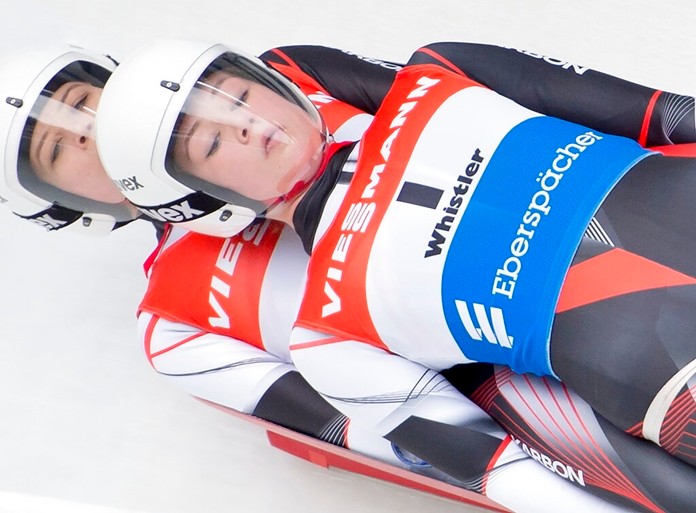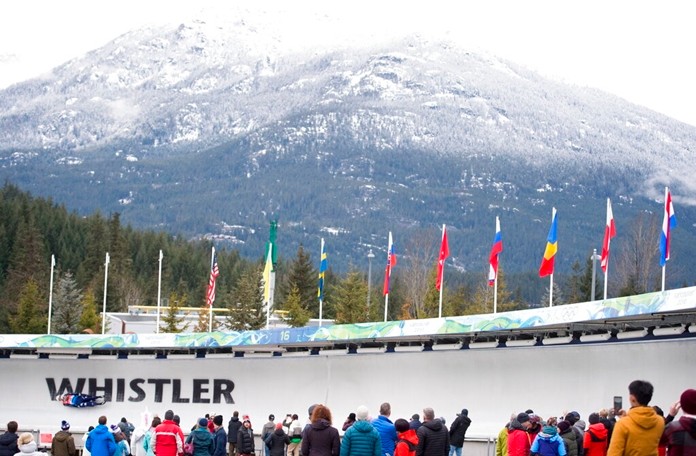
Whistler, British Columbia (AP) — Caitlin Nash and Natalie Corless made luge history Saturday, becoming the first female team to compete in a World Cup doubles race.
The 16-year-olds from Whistler combined to finish 22nd in a field of 23 sleds, though that seemed largely irrelevant. There have been four-woman teams in what is typically called four-man bobsledding, but luge has never seen a pairing like this until now.
“It’s crazy,” Nash said after the race. “I don’t think it’s sunk in yet.”
The German sled of Toni Eggert and Sascha Benecken won the race in 1 minute, 16.644 seconds. Germany’s Tobias Wendl and Tobias Arlt finished second and the Russian team of Vsevolod Kashkin and Konstantin Korshunov placed third for their first medal of the season.
The U.S. team of Chris Mazdzer and Jayson Terdiman placed 11th.
But the story was the Canadian teens, who qualified for the World Cup event on Thursday. They were nearly a half-second behind any other finisher and almost 2.7 seconds back of Eggert and Benecken. But they’ll forever be able to say that they were winning the race at one point — a technicality because they were the first ones down the hill at the Whistler Sliding Center, but accurate nonetheless.
“Pretty crazy,” Corless said. “We proved that women can do this. We showed that today.”
The only sled they beat was the Italian team of Ivan Nagler and Fabian Malleier, who crashed in the second heat.
There are women’s singles and men’s singles races on the World Cup luge circuit, but there is no rule saying doubles teams must be composed of two men. There have been more female doubles racers at the junior level in recent years, and it was generally considered to be just a matter of time before it happened at the World Cup level.
That time became Saturday.
Canada had the chance to qualify a second sled into the doubles field because some teams typically on the circuit chose to skip this weekend’s stop, and Nash and Corless got into by successfully finishing a Nation’s Cup qualifying race on Thursday.
They were 11th in that race out of 11 sleds, more than a full second behind the winner and nearly a half-second behind the closest finisher. But all they had to do was cross the line without crashing to get into Saturday’s competition, and earned their spot in the luge history books as a result.

“We wanted to lay down two consistent runs, pull a good start,” Nash said. “We had a couple goals in mind and we achieved those so we’re super happy. We just showed everyone what we can do, so we’re super happy.”
Eggert and Benecken also won a sprint World Cup doubles race later Saturday, with the top three sleds separated by four-thousandths of a second. Eggert and Benecken won in 27.759 seconds, Wendl and Arlt took second in 27.762 and Kashkin and Korshunov third again in 27.763.
Sweeney Silver
USA Luge got a silver medal in a women’s sprint World Cup race Saturday night, with Emily Sweeney claiming that to move into third in the seasonlong points standings.
Russia’s Tatyana Ivanova won the race in 27.839 seconds. Sweeney was second in 27.883 and Germany’s Cheyenne Rosenthal was third in 27.904.
In the men’s sprint race, Austria’s Reinhard Egger won in 36.449 seconds to edge Russia’s Roman Repilov (36.456) and Austria’s Jonas Mueller (36.493). Tucker West led the U.S. with a sixth-place finish and Mazdzer took ninth.
 |
 |
 |





